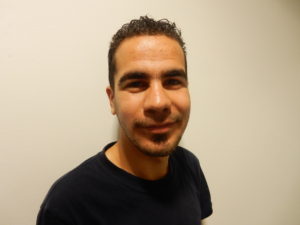Young refugee following his dreams
Iraqi refugee Mustafa Alsaffar’s 26 years on earth have coincided with the most turbulent and tragic period in his nation’s history.
Born in 1990 at the height of the first Gulf War, he grew up amid a backdrop of conflict and civil strife that included the brutal regime of Saddam Hussein, the US invasion of Iraq, unrelenting sectarian strife and the rise of the murderous Islamic State.
Growing up amid civil strife, mere survival was the priority and pursuing dreams or passions out of the question. But now for Mustafa hopes for a future that is not just about staying alive.
Originally from Al Najaf, in mid-west Iraq, Mustafa and his parents, two brothers and sister have been in Australia a year.
 “Life in Iraq has been very hard. We lived with the threat of violence and much uncertainty about the future,” he said this week.
“Life in Iraq has been very hard. We lived with the threat of violence and much uncertainty about the future,” he said this week.
“I was born in 1990 when the first Gulf war took place. Then from 1991 we had civil war with the government attacking their own people. It was a problem for everyone.”
Mustafa’s family are Muslim Shias, part of a group who historically opposed the Baathist Sunni regime of Saddam Hussein.
“It was very difficult for us, my father was jailed about 20 times,” he said.
After 2003, when the war which saw Saddam Hussein removed ended, Mustafa and his family hoped things would improve.
“We thought life would be good but things got worse,” he said.
“There was violence between different groups and I lost some of my friends. Some of my friends went out from their homes – just doing normal things – and they disappeared.
“Their families still don’t know what happened to them.
“At that time my family feared myself and my brothers would also disappear,” he said.
The once prosperous family owned a factory that made ceramic floor and wall tiles but that has closed.
“In Iraq, things are collapsing. When I talk to friends and family in Iraq, they say the economic life has stopped. The economy is not functioning. The education system and the health system are going down. There is continuing violence,” Mustafa said.
And then the rise of ISIS was the last straw for Mustafa’s family as it made forays into their home town of Najaf.
“In 2010 my father decided that we should find another place to live. Already my uncle had been living in Australia since 1998 and he sponsored us to come here,” Mustafa said.
“When ISIS came to Iraq from Syria, my father was overseas but he was frightened for us and told us to get out of Iraq and go to Turkey or Saudi Arabia. But then the crisis passed and we got our visas to come to Australia,” he said.
Mustafa had just finished Year 11 when going to school and much of ordinary life became unsustainable because of sectarian violence and the rise of ISIS.
“I didn’t finish my last year of high school,” he said.
Mustafa has been studying English with migrant and refugee settlement agency AMES Australia in Melbourne. He has done further study at RMIT and is thinking of studying for qualifications in nursing or telecommunications.
In the meantime he has gained a month’s casual work with Australia Post.
His siblings and parents are also studying here. His parents and brothers are improving their English and his sister is studying nursing.
Mustafa says he has acclimatised to life in Australia.
“When I first came here I had no friends, no job and my English was about 10 per cent,” he said.
“But after I spent some time at AMES I made friends from different cultures, countries and with different languages. After six months I felt more comfortable.”
Through AMES Australia, Mustafa has been involved in the UCan2 Program which has seen him take part in sports activities, excursions and photography.
“The best thing about Australia is that people care. For example, in my country if you don’t have any work or something happens to you, no one cares – especially not the government,” Mustafa said.
“But here every one cares. If you don’t have work or something happens to you, the government will help you. And there are all these organisations that will help you.
“But the best thing is that here, you can do anything you want. In my country at Year 12 everything is decided for you for the rest for your life. And everyone in my country says you should be a doctor or an engineer – even your family.
“But I love photography and I want to be a photographer but in my country they don’t care about your dreams.
“But I’m happy here in Australia because you can follow your dreams. Maybe I can be a photographer,” Mustafa said.
Laurie Nowell
AMES Australia Senior Journalist












